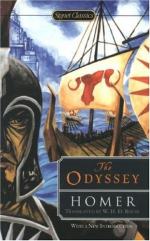Then to the dance they form the vocal strain,
Till Hesperus leads forth the starry train;
And now he raises, as the daylight fades,
His golden circlet in the deepening shades:
Three vases heap’d with copious fires display
O’er all the palace a fictitious day;
From space to space the torch wide-beaming burns,
And sprightly damsels trim the rays by turns.
To whom the king: “Ill suits your sex to
stay
Alone with men! ye modest maids, away!
Go, with the queen; the spindle guide; or cull
(The partners of her cares) the silver wool;
Be it my task the torches to supply
E’en till the morning lamp adorns the sky;
E’en till the morning, with unwearied care,
Sleepless I watch; for I have learn’d to bear.”
Scornful they heard: Melantho, fair and young,
(Melantho, from the loins of Dolius sprung,
Who with the queen her years an infant led,
With the soft fondness of a daughter bred,)
Chiefly derides: regardless of the cares
Her queen endures, polluted joys she shares
Nocturnal with Eurymachus: with eyes
That speak disdain, the wanton thus replies:
“Oh! whither wanders thy distemper’d brain,
Thou bold intruder on a princely train?
Hence, to the vagrants’ rendezvous repair;
Or shun in some black forge the midnight air.
Proceeds this boldness from a turn of soul,
Or flows licentious from the copious bowl?
Is it that vanquish’d Irus swells thy mind?
A foe may meet thee of a braver kind,
Who, shortening with a storm of blows thy stay,
Shall send thee howling all in blood away!”
To whom with frowns: “O impudent in wrong!
Thy lord shall curb that insolence of tongue;
Know, to Telemachus I tell the offence;
The scourge, the scourge shall lash thee into sense.”
With conscious shame they hear the stern rebuke,
Nor longer durst sustain the sovereign look.
Then to the servile task the monarch turns
His royal hands: each torch refulgent burns
With added day: meanwhile in museful mood,
Absorb’d in thought, on vengeance fix’d
he stood.
And now the martial maid, by deeper wrongs
To rouse Ulysses, points the suitors’ tongues:
Scornful of age, to taunt the virtuous man,
Thoughtless and gay, Eurymachus began:
“Hear me (he cries), confederates and friends!
Some god, no doubt, this stranger kindly sends;
The shining baldness of his head survey,
It aids our torchlight, and reflects the ray.”
Then to the king that levell’d haughty Troy:
“Say, if large hire can tempt thee to employ
Those hands in work; to tend the rural trade,
To dress the walk, and form the embowering shade.
So food and raiment constant will I give:
But idly thus thy soul prefers to live,
And starve by strolling, not by work to thrive.”




